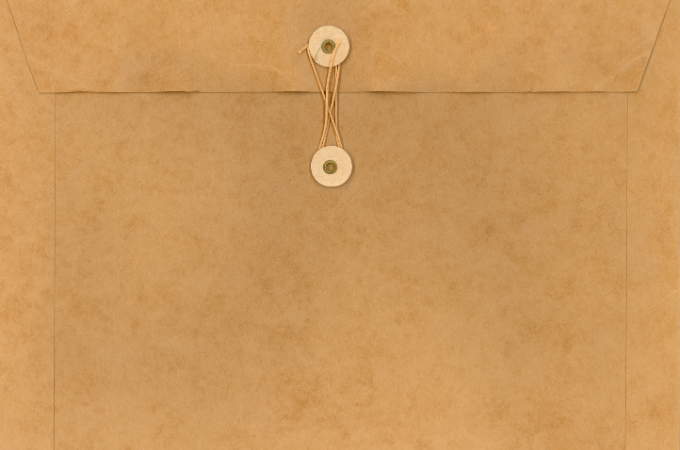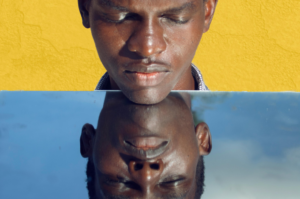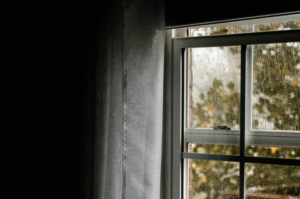
I don’t know how this is related, but plants love better than us. Plants do not judge. They do not offer an unsolicited opinion. And neither do plants have opinions, they mind their business. Plants do not even love us back – at least not like that – they respond to our love and tenderness by flourishing. But they’re better lovers than us – not in the sexual way – but love. Plants love. And plants do not lie. They flourish or die. Plants take the love we give them and multiply it by flourishing. They do this for us, the givers, by showing us the effects of our love on them. Plants are givers. They take but give. Plants are like our parents – they’re just like Mama. Mama does not just want us to love her back or give back her love. Her satisfaction is seeing us thrive. Mama wants us to blossom. Her phone ringtone is a prayer for us. Her prayers pray for us more than they pray for her.
I was raised in a rural African village. Yes, it’s poor, and dry and in the South of the Sahel, ruled by intensive grasslands and rain that pours the way it wants. It’s poor but it’s also my home. And home is best. We are poor but we are happy. Or rather, we flourish. We are poor but we flourish. However, in the scramble of living, Mama would watch her own dreams scatter before she would ever let the world crush ours with a bare-knuckle. Well, the world can crush our dreams, but it won’t crush us.
You see, when Mama graduated from the teachers’ college, she had hopes of joining the government pension scheme through the Teachers Service Commission – the no nonsense body that employs hundreds of teachers and underpays them to overwork. Mama’s dream came true when she was deployed to a desolate junior school in the hardship zone of some badlands. Being a mother – like every mother, she could either abandon us to live on our own with dad, and move to her new work station. Or she could move with us, leaving dad behind in his teaching job at the local school, where we also went to school. It’s one of those decisions people have to make. Or they don’t.
She was in the middle of juggling this conundrum when Uncle P turned up from the city, with his newspapers and money offerings. We love Uncle P’s money gifts because Mama hates them. I do not usually like uncles who turn up from the city carrying news articles and money to buy sweets – especially when they arrive late and during a moment of truth. They move around like false messengers spreading invisible hope. They seem to have it figured out, until they don’t, which we realize many years later when we too join the city and start offering false promises of our own. It’s finally then that we discover that they’re perhaps dishonest phonies lavishing in the brutal uncertainties of the big city. And we have become them. We’re such sneaky quacks, you can hear our quacking. We become those uncles we loathed. Why do we become the people we loathe? Soon, we realize we’re now the drunk uncles in every family gathering – knowledgeable and fuzzy – carrying the hopes and promises of the village on a brown envelope. I hate hope. I hate hope in a brown envelope. Even more, I hate people who spread false hope – but hate is a strong word, maybe loathe.
I do not give hope, it’s not my place in the universe. I dislike people who spread false hope. It’s like watering plants in the rain. They’re like those false prophets or crypto scammers prowling the web for their next kill. They’re selling these imaginative dreams packed with illusionary returns – at the cost of a ‘smallish investment in a brown envelope.’ It’s not your success they’re after – it’s your ‘tiny’ envelope. They’re poker masters promising huge returns. They’re selling you the entire house. But you’ll never get the patio. They’ll take your tiny balloon of hope and blow it into a big bubble – magnifying your exasperation. They pump your imaginary balloon to the whims of plausibility and then suddenly – and just like that – prick it with a sharp word, not two, banging it into oblivion – crashing your tiniest dreams. They lock your promises in a brown envelope. And then the blame rests on you. Our house didn’t win this time. Our house never wins. Uncle P’s house was this immediate emancipator – consistently turning up when needed. He was ‘very well-connected’ in government. Here, we thrive on connections. In a web of deceit, even spiders get entangled.
According to Uncle P, Mama didn’t need to report to her new work station for deployment. She didn’t need to work on her deportation. She would remain calm and let him use his extensive networks. He knew someone who knew someone whose daughter was married to someone who served hot tea in some government cafeteria. Uncle P said he’d call someone to call someone. That issue was solved that day – right there, under the stewardship of drunkenness. Uncle P would handle Mama’s transfer to a nearby school. Himself. We trusted him. We all trust our families.
Many dreams have been crushed in family trust – in dark closets between locked drawers inside desks of invisible offices. Many dreams have been trashed in unopened brown envelopes in countless locations. They’re dreams in a brown envelope. They are unopened CVs and promissory notes locked shut in an uncle’s desk – whose content has never been perused or shared. They hide the lies we tell. We use untruths to excuse ourselves from the inexcusable – like the guilt of lying to a loved one. And the pain of lying to family. We believe lies – distrusting our innate survival instincts that have been there since we lived in a cave.
“Every kungulu kwangala in the dark should be treated with the suspicion of an invader” is a forgotten metaphor. (Kungulu kwangala is the sound made by rats in the granary.) You know rats by that sound. Every time Uncle P visited home, there was this kungulu kwangala of a new rat – fresh and improved. There was a new character who was more of a protagonist than the last. A good story only needs one protagonist. The story arcs kept shifting in timeless innuendos of we-should-do-thats, such that I lost track of progress. I like tracking progress. Mama’s progress was slowly fading. All she needed to do was report to her new work station. I was about thirteen and had soon lost them – the main characters in the story of a poor woman who failed to report to work on the feint promises of her husband’s drunkard brother. I guess that’s when I went to a boarding school for my high school studies. And then I forgot. We usually forget.
But I remember Uncle P. I remember that he came home like a UFO on an alien spacecraft. He seemed to arrive unannounced and in a hurry – a lot of hurry. We said that he was busy at work. I remember him because he went to the best high school in the country and was my role model. He came home with newspapers, a certain magazine that had his name, and a framed photo with some government officials. He brought us money to buy sweets and never carried bread or those sweet-nothings people carry from the city. African men do not carry gifts or baggage. They’re the gift. They’re the baggage. Uncle P usually came home like a ghost. Now you saw him and then you didn’t. He called us natives and kidnapped dad from the local primary school to the drinking den – o r thereabouts. Dad would come home different. He had with him plotless stories of questionable characters with gigantic titles who worked in government. Mama’s situation was under control.
There was a Mr Kulova whose brother was a senior manager with the teachers’ employer and whose wife had given birth to twins or triplets – I didn’t count. I couldn’t count. A Mr Mukulwa who had forgotten to send Mama’s redeployment letter to the government stamp but would be doing so ASAP – on a working day – which meant as soon as he woke up from his stupor without a remnant memory that he worked in a government office. There were so many senior officers involved. But again, I didn’t count. Everyone was a senior manager in some senior government office. They were all connected. We are all connected. There was also an unnamed guy with an uncanny demeanor who operated this web of promises and undoing. They mentioned him every time. Dad seemed to miss him whenever he went for an official call. I didn’t get his name. “He’s a very busy man,” I once heard. He seemed to know everyone in every government office. I have never understood why they needed so many government offices for a simple deployment. Those men seemed busier than those SpaceX spaceship teams. Dad said the man was his drinking buddy. This he insisted, shrinking his left eye.
I’ve often felt that I have the instinct of a cat – if cats have that. I feel things I am not supposed to feel. I see the overconfident look on a worried face. I see things before other people see them. I feel. I see things in people. I see people. I see the future – even in its excessive uncertainties and pedantries. I cannot explain this because I know that it’s not humanly possible. How do you explain the impossible? I remembered that I saw through Uncle P. I guess it was the child in me. Children often see a purer world before we corrupt it for them. I saw that it was not good to crush people’s tiny hopes. I saw that it was not easy living through the countless unthawed characters in Mama’s quantum story. It was an infinite story entangled in a liminal haze of the-lies-families-often-tell. I saw it with my two eyes. I felt it with my own heart. I starred in the game of losers. I watched the disintegration of a family based on a single lie.
When it’s the monkey’s day to die, all the trees get slippery. Every branch gets soapy in the rain. When Uncle P finally rested, years later, I remembered Mama’s brown envelope and the promises it held – lying unopened in some office drawer – clean and untouched in her fabulous handwritten font. A little bird told Mama that the envelope had never moved. I remembered this. And the fictional stories of Mr. Kulova. And the forgetfulness of Mr. Mukulwa. And the uncanny demeanor of the unnamed guy who operated this web of promises and undoing – and wasn’t dad’s best friend. And yet Uncle P delivered our hope. I’m still a native, but a better native. Uncle P was sent by the ancestors to nourish our hopes and dreams. It’s the seed of hope he planted in me. Sometimes I see him now, back home, as I bring him his newspapers. But Mama. I think I can only flourish more for Mama. I can deliver Mama’s redeployment letter, albeit differently. I can flourish.
Several years passed. People have died. Deep hatred has been marinated with specks of love, especially during a family funeral. As if it makes hate better. We regularly come together to bury a loved one. We are united in grief as we leave our hiding spots in the big city and visit our village home. I read somewhere that ghosts are about seeing. And that ghost stories do not only contain ghosts. I’ve seen ghosts. At our funerals, there are lots of ghosts. They visit home and vanish like they don’t belong. They’re on the run. We are ghosts in our own funerals. Maybe ghosts see us at the cemetery burying our loved ones and laugh. Maybe they do, and then maybe they don’t. Maybe we are ghosts. We are the ghosts of Uncle P. We leave as unopened stories in a brown envelope, to be delivered to a closet drawer.
Our stories will never be told. They remain untold. How do we tell stories of people who do not want to be remembered? How do we tell our own stories? Mama’s story might be lying in some government locker – unopened, ignored, untold. I don’t know what Mama thinks when she sees us. I am now the drunk uncle in every family gathering. I am the holder of the brown envelope. I give back what is given to me, and just like dad, I blink an eye to my drunk friends as we journey together to explore the love of nature. I keep my family’s promises. I am the one they knock on. I keep their job promises. Marriage promises. Book promises. Opportunity promises. I am the convener of hope. I am a lie enclosed in its own brown envelope, just like everyone is back at home. I am the stories I tell myself.
A story is like a painting. As the surface ages, some old paint becomes transparent. If we look closely, we can discover minuscule alterations – a change in some line, a new curve or the tint of a particular hue. Sometimes there’s a change in the original intention of the painter.
We could quit writing and start painting. Mama could unearth a perfect pentimento under her painting of Uncle P. Her blank canvas must have started with trust. It all starts with trust. As truth erodes in time, we uncover stained underdrawings in the image that Mama gave us of Uncle P – which include the shifting shape of a village witch. I know Uncle P was not a witch – I don’t know how I know this, but a painting was altered. I do not blame Mama. I don’t think anyone would blame her either.
Maybe there are old stories hidden behind the one we have been told. Maybe we need to scratch some surface to reveal what’s beneath. Maybe the past will get clearer in time.
Or maybe we’ll never know. Perhaps what we need to do is unpaint the images of the past.
How do you unscratch a solipsistic concert with the devil? How do we uncover jealousy and envy? What do we use to colour a coat of capricious malevolence? How do we underscore the past with truth?
There are two types of stories; there are the stories we tell, which we often believe to be true, and then there are the true stories of others. These stories are easy to tell. Lying is easy – it’s fiction and has no boundaries. Truth is the only difficult story. How do we ever get to tell the truth? How do we tell difficult stories? Someday, maybe, we’ll sit under a gargantuan fig tree and open all the brown envelopes – like we used to do when we shared some common virtues. Then, we might open Uncle P’s envelope and read his untold story. It’s not easy to untell what we know – what Mama knows. It’s not easy to paint over pain. We might get the chance to know Uncle P’s story, but how do we ever know the truth?
What is the colour of truth when we can never know what’s going on in people’s minds? Truth, then, maybe, is colourless. Just maybe. But then, we’re not trees. I think only trees can tell the colour of truth.










COMMENTS -
Reader Interactions